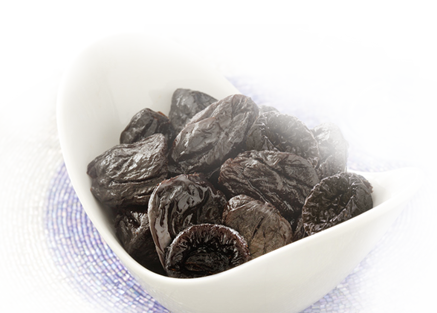
what you should know about prunes
Nutritional Facts
We have prepared a summary of nutritional facts for prunes using our interactive swivel cards which we hope will be easy for you to digest - pardon the pun! We also provide some detailed information on each of these nutrition facts which you can read below:
Nutrients
Fibre
- Prunes contain 7.1g of fibre per 100g, that’s about a quarter of your daily needs.
- Prunes provide both soluble & insoluble fibre.
- Research has proven that prunes are good for digestion and help keep you regular, when 100g are eaten daily. Prunes can be enjoyed as part of a varied and balanced diet and an active lifestyle.
Carbohydrate
- Prunes contain carbohydrate. Carbohydrates help maintain normal brain function, when 130g of carbohydrates are consumed daily.
Sorbitol
- Prunes contains 15g of sorbitol per 100g. Sorbitol, which is a polyol, is a type of carbohydrate. In the bowel it attracts and holds water like a sponge, not all sorbitol is digested and this further facilitates normal bowel function.
Vitamins
Vitamin B6
- Prunes are a source of Vitamin B6.
- Vitamin B6:
- Supports hormone regulation
- Contributes to normal mental health
- Make normal blood cells
- Supports a healthy immune system
- Helps you feel less tired
- Supports the normal function of the nervous system
- Contributes to normal cysteine synthesis
- Supports the normal release of energy from foods
- Contributes to normal homocysteine metabolism
- Contributes to normal protein and glycogen metabolism
Vitamin K
- Prunes contain a whopping 79% of the daily recommended intake of Vitamin K per 100g.
- Vitamin K:
- Supports the maintenance of normal bones.
- Helps with normal blood clotting.
- Note: Interesting research is currently underway that is exploring the potential role of prunes in bone health
Copper
- Prunes are a source of copper.
- Copper is an antioxidant nutrient that:
- Plays a role in protecting cells within the body from oxidative damage.
- Supports a normal nervous system.
- Helps maintain normal looking hair.
- Supports normal iron transport in the body.
- Helps maintain normal skin.
- Supports a normal immune system.
- Plays a role in maintaining normal connective tissues.
- Supports the normal release of energy from foods.
Potassium
- Prunes are high in potassium.
- Potassium:
- Supports a healthy nervous system.
- Helps your muscles work normally.
- Supports normal blood pressure.
Manganese
- Prunes are a source of Manganese.
- Manganese:
- Supports normal bone maintenance.
- Is an antioxidant nutrient that plays a role in protecting cells within the body from oxidative damage.
- Supports the normal release of energy from foods.
- Plays a role in normal connective tissue formation.
Nothing Added
No Sugar
- Prunes contain only naturally occurring sugars, with no added sugar.
No Salt
- Prunes are naturally salt-free.
- Reducing intake of sodium (salt) helps maintain normal blood pressure.
No Fat
- Prunes are naturally free from fat and saturated fat.
- Reducing consumption of saturated fat helps maintain normal blood cholesterol levels.
Prunes and prune juice can be enjoyed as part of a varied and balanced diet and a healthy lifestyle. For detailed information on the nutrition content of prunes and prune juice please visit our products page.





